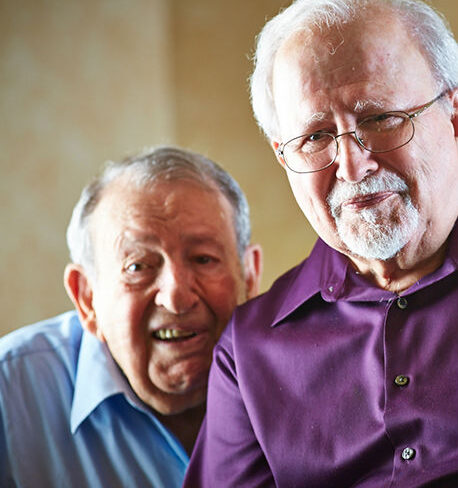For caregivers of loved ones with Alzheimer’s, dealing with the effects of the disease can often feel like caring for a toddler.
But it’s important not to treat an aging loved one with Alzheimer’s like a child. That is, don’t talk down to them, sound patronizing, use “baby” words like “diaper” or “bib,” or have conversations about them in their presence while ignoring them.
Treat your aging loved one with Alzheimer’s as a capable adult. Here are a few ways you can do that:
Dignity & Dementia
Think about Your Loved One’s ‘Life Story’
Every person has a history of likes and dislikes. We all have a past and a personality that makes us who we are. Keep this in mind when caring for a senior with Alzheimer’s.This includes respecting their sense of spirituality, the foods they prefer to eat, and the things they like to do.
Remember That Your Loved One is More Than a Diagnosis
Caregivers often focus so much on numbers and statistics, such as their aging loved one’s weight, how much food they’ve eaten, blood pressure or blood sugar levels.
Don’t just pay attention to vital statistics
Ask your loved one how he or she feels daily. What would make your loved one comfortable? Happy? Consider alternative ways of increasing their sense of self such as with music, art or pet therapy.
Build Confidence and Self-worth by Getting Back to Basics
In some ways, it is appropriate to treat your aging loved one as a child you love. That is, show respect and patience. Speak kindly and compliment them genuinely and generously to increase their self-esteem. Give them tasks they can accomplish to help maintain their self-worth. But don’t expect more from your aging loved one than they are capable of.
Answer questions patiently—no matter how many times you must repeat your answer.
Learn their daily patterns and routines and use them as a way to create a stable environment. This can help reduce confusion, sundowning, and aggression in seniors with Alzheimer’s.
Let Your Loved One Do as Much They Can
Your loved one’s patterns, understanding, and capabilities may change daily. Allow them to do as much as they can at any time. This may include bathing, feeding themselves, or light chores. Step in to help only when you see it’s needed. Good caregiving changes daily based on your loved one’s needs. And research shows that allowing a person with Alzheimer’s to do as much as they can for themselves may delay the progression of the disease.
Listen to Your Loved One
How do you know what your loved one needs at any given moment?
Listen.“I’ve found the best caregivers are the ones who give themselves permission to enter into the world of the person they’re caring for. What that means is looking for signs –the life someone once led, their passions, daily routines, and memories, all still matter,” writes columnist Molly Carpenter at EverydayHealth.com.
Watching and listening with true empathy can help you, as caregiver, provide what your loved one needs at any given time. Doing so helps preserve your loved one’s dignity.
Dignity and Sense of Self Contribute to a Better Quality of Life
Evidence shows that people with Alzheimer’s who maintain their dignity and receive respect from caregivers have less risk of depression and anxiety, leading to a better quality of life.
Five Star Senior Living offers a personalized approach to memory care. Contact us to learn more.
Contact Us Today
"*" indicates required fields

